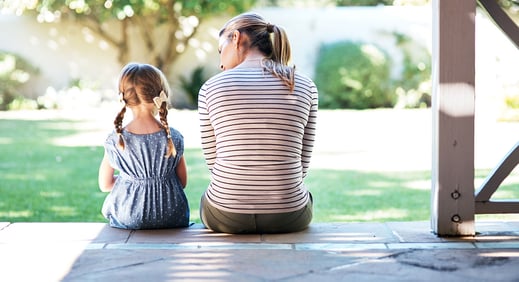
The current situation around the coronavirus can feel like a scary time for children. There is so much uncertainty in the world right now. When a child stays at home, away from school, it only amplifies their uncertainty. Children should be aware of what’s going on in the world so they aren’t confused when they hear about it on the news or from a sibling or friend.
It can seem tough to have conversations about the coronavirus with kids. Here are 3 things you can do to make these conversations easier and to help combat some of their fears.
1. Explain the Coronavirus in Terms They Can Understand
This will vary depending on your child’s age but it’s important to use simple language. Ask young children to think about when they’ve had a cough or fever before, and how they had to see a doctor and get rest to feel better. Tell them this situation is similar to that. Help them understand that since this is a new kind of sickness, people who don’t feel well need to practice what’s called “social distancing” for now. That means that people should not be close together outside their own family, to prevent the virus from spreading.
No matter their age, this is the perfect time to talk about cleanliness and best practices. Remind them that it’s important to wash their hands with soap and water for at least 20 seconds before every meal. You can use a timer or sing a song like “Baby Shark” up until the “mommy shark” part of the song.
Explain how they should always cough or sneeze into their elbow so they don’t pass the germs to someone else. And if they forget, tell them that washing their hands right away will get rid of the germs.
2. Check in On Their Feelings
Check in with your child and ask them how they’re feeling. Don’t assume that they will come to you if they’re scared or confused about what’s happening. Sometimes kids aren’t sure how to express themselves so talking to an adult, even a parent, can be scary. Ask them to draw their feelings about the situation if they don’t want to talk about them. Or have them talk to a stuffed animal that they love and trust while you listen.
Reassure them that they’re safe and that there are a lot of doctors and nurses who are working to make sure people get better. Finally, let them know that it’s okay to feel scared. Fear is a normal human emotion just like feeling happy or sad.
3. Establish Routines
If your child isn’t in school right now, establish predictable routines so they have a sense of structure and normalcy. While it doesn’t have to exactly follow their school routine, it should follow the same flow every day. Consider going over their daily routine every morning or creating a picture schedule they can look at while eating breakfast.
Something you can work into your routine is planning special time everyday for your child. This could be video chatting with a family member or friend, watching a movie together, or baking a fun treat. Children also need time to move around so make sure they’re getting daily exercise. This could be in the form of dancing, following an exercise video, or running around in the backyard.
Help Ease Fears
It’s important that children know what the coronavirus is in terms they can understand and that they’re being heard when it comes to their feelings about the situation. Before you talk to them about the coronavirus, think about what brings them comfort and how you can help them feel safe even as things are changing.
For more tips and ideas on navigating challenges related to the coronavirus, join our free CLASS Learning Community.

